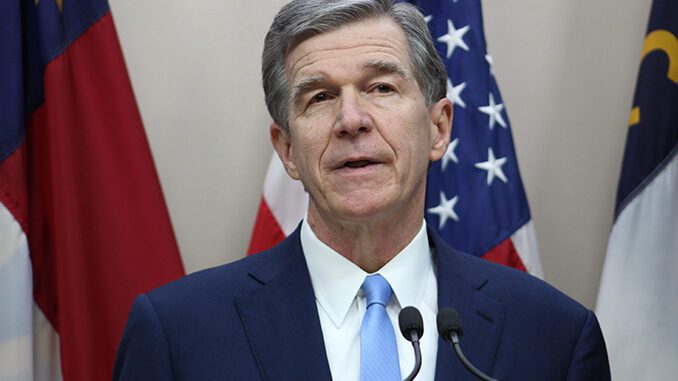
RALEIGH —Democratic Gov. Roy Cooper announced March 14 he had signed an executive order establishing the Office of Violence Prevention to be located in the N.C. Department of Public Safety.
The announcement was made during a press conference that also included Democrat Attorney General Josh Stein, Department of Public Safety Secretary Eddie Buffaloe and N.C. Department of Health and Human Services Secretary Kody Kinsley.
Remarks given by Cooper, Stein and Kinsley all had gun control themes.
“Too many families and communities are enduring the tragic injuries and deaths from homicide, from carelessness, from suicide. And whether a gun is used or not, violence is a tragedy that has to be stopped,” the governor said during the press event. “It requires an all-hands-on-deck approach, and that’s what this is about today.”
Stein urged for universal background checks, red flag laws and raising the minimum age to 21 for the purchase of a semiautomatic rifle.
Cooper also criticized the General Assembly for attempting to expand Second Amendment rights.
“The legislature is looking to pass several gun bills,” he said, “but I would like us to move forward to fight gun violence with legislation instead of backward.”
In particular, Cooper opposes the attempt to repeal the state’s pistol permit purchase system, which the N.C. Association of Sheriffs has supported and has characterized as “duplicative” with federal firearms purchase processes.
“The facts tell a different story than the governor,” said a spokesperson for Senate Leader Phil Berger (R-Eden) in an email statement to North State Journal. “Over the last five years, there have only been four convictions for obtaining a pistol without getting a permit first. The claim that repealing the pistol purchase permit will make our communities more dangerous is absurd.”
The purpose of the office is to “focus on reducing violence and firearm misuse in North Carolina.” The executive order describes violence as a “public health issue,” and the new office will have an advisory board, although there is no mention of who will be on that board or how members will be selected.
“All of us deserve to feel safe in our homes, our schools, and our communities,” Cooper said in a press release. “This new office will help coordinate the efforts to reduce violent crime, tackle both intentional and careless gun injuries and deaths, and work to keep people safe.”
Combatting the rise in violent crime related to drugs and human trafficking was noticeably missing from the executive order and remarks given by Cooper and various officials.
The release also mentions crime and safety funding in his newly proposed two-year budget. The amount in his proposal is $104 million.
Cooper’s statement says the new office will work closely with other state agencies, including the North Carolina Department of Health and Human Services, and some of the offerings will include training, issuing best practice guidance, conducting public awareness campaigns, and identifying and applying for funding from federal and philanthropic sources.
The announcement of the new office follows the final report by Cooper’s 24-member Racial Equity in Criminal Justice task force (TREC) chaired by Stein and N.C. Supreme Court Associate Justice Anita Earls. After two years of meetings, only 21 of TREC’s 125 total recommendations are listed as a “success.” Among the items listed as a success are topics like Community Policing, “Diversion” tactics, Encouraging citations and summons in lieu of arrest whenever possible.
Since 2019, violent crime in North Carolina has risen substantially, surpassing the national rate in 2020 by almost 21 points.
According to the FBI’s Crime Data Explorer, in 2021 there were 31,682 violent crime incidents and 41,996 offenses reported in North Carolina to the National Incident-Based Reporting System (NIBRS). The number of violent incidents and offenses could be higher since NIBRS only received data from 387 of 531 law enforcement agencies in the state that year.
The N.C. State Bureau of Investigations’ 2021 data shows an overall decrease in crime over 2020’s figures of 5.6%, with violent crime and property crime also dropping by 3.6% and 6.1%, respectively. However, while robbery dropped 17%, homicide rates rose 18.3% and rapes were up more than 7%.
Some peaceful tourist and retirement destinations in the state have become crime-ridden, such as Asheville, a city of around 90,000 people where crime rates have risen 31% over the last five years and had a reported 21% spike in homelessness since 2021.
Violent crime in Asheville is almost double the national average and ranks among the highest in North Carolina, according to a 2022 report given to the town council by the Asheville Police Department. The report also said gun violence was declining.
Charlotte saw 120 homicides in 2020, the city’s second-highest number on record since it hit 122 in 1993. In the third quarter of 2022, Charlotte’s police department said overall crime was up 4.5% compared to the previous year with property crime rising 6.8% and violent crime down 4.8% over 2021.
In the state capital of Raleigh, violent crime has also increased over the past few years. A 2022 crime statistics report by the Raleigh Police Department (RPD) shows 43 homicides that year, up from 33 in 2021, a 30% increase.
Based on the RPD report, the increase in homicides between 2018 and 2022 is nearly 153%. Aggravated assaults involving a firearm have risen (7.5%) from 106 in 2020 to 114 in 2022 with blacks making up the vast majority (more than 86%) of the victims, according to the report.
The rise in crime seemed to spike following the pandemic lockdowns instituted by Cooper but also violent riots that swept across North Carolina in 2020 after the death of George Floyd.
The riots, which spanned from May 30 through June 2, cost millions in taxpayer dollars and included arson, looting and widespread property damage in cities like Charlotte, Fayetteville and Raleigh.
House Speaker Tim Moore (R-Kings Mountain) shared video footage he filmed from his cell phone and called on the governor to activate the N.C. National Guard.
The governor didn’t issue a statement until 12:29 a.m. on May 31 when he finally issued a single tweet that said, “I am in continuing contact with Emergency Management leaders about violence occurring in some of our cities. Frustrating that planned peaceful protests about real systemic racism are marred. I am grateful for those seeking justice peacefully.”
Cooper’s lack of action during the riots drew seven-figure ad buys during the 2020 election cycle by the Republican Governors Association (RGA) and showed footage of Cooper walking around outside of the Executive Mansion with protesters with his mask dangling from one ear.




